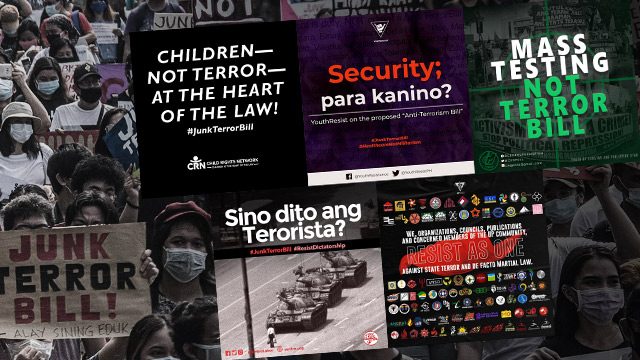SUMMARY
This is AI generated summarization, which may have errors. For context, always refer to the full article.

MANILA, Philippines – Several groups denounced the recent passing of the anti-terrorism bill in Congress, which many fear will be used to stifle dissent from government critics in the midst of the coronavirus pandemic.
The bill has been passed by the Senate and the House. Both chambers will just need to ratify the final version before sending it to President Rodrigo Duterte for his signature.
Duterte himself certified the bill as urgent, and the groups said this reflected government’s “misplaced priorities” during the coronavirus pandemic.
In an open letter, members of The Movement for Good Governance said measures urgently needed in the middle of a pandemic should cater to “recovery, not repression.”
“We strongly urge you to focus on measures to help our nation and people recover from the current crisis. We do not need measures that add to their burdens,” the letter said.
The College Editors Guild of the Philippines (CEGP) urged lawmakers to “properly represent and address the public and their concerns” in the pandemic.
“Instead of passing detrimental policies, the state must heed to the people’s demands by giving immediate economic and medical aid [to those] gravely affected by the COVID-19 pandemic,” CEGP national president Daryl Angelo Baybado said.
The Child Rights Network said “activism and empowered participation” are necessary in upholding children’s rights, adding that the bill would bring more “unnecessary and unjustified powers” in the hands of the same State implementers that murdered 17-year-old Kian delos Santos.
The Center for Environmental Concerns – Philippines (CEC-Phils) called for “adequate public health and socio-economic response from the government” in the midst of the pandemic.
CEC-Phils executive director Lia Alonzo said the bill would also only “further intensify the already worsening attacks on environmental defenders.”
AGHAM Laguna dubbed the bill’s passing as an “ominous indication of the government’s shameless contempt for human rights and civil liberties.”
“We fear that the anti-terror bill will endanger the lives of scientists and engineers who assist marginalized communities by delivering services that the government simply refuses to provide,” the statement read.
The Partido Manggagawa said the railroading of the bill in Congress showed that the government’s “hunger for extrajudicial authoritarian powers” have become more urgent even amid the pandemic. “The Duterte government is more inclined to becoming a reckless dictator during this period rather than a sensible marshal of a better normal,” the group said.
UP Rises Against Tyranny and Dictatorship, a multi-sectoral alliance of members of the University of the Philippines (UP) community, encourages Filipinos to “struggle for democratic rights amid the pandemic.”
“The three-month long lockdown points us in no other direction than the normalization of draconian social control, which will be sealed by the anti-terrorism bill,” the statement reads.
Youth Resist dubbed the anti-terrorism bill “an anti-democratic legislation,” questioning the motives behind the bill’s passing.
“[Whom] does this law truly serve? Does this mean security for the people, or security for those in power? We need only look at our recent history to find an answer,” Youth Resist wrote.
The Confederation of Publications of the Ateneo De Manila University, composed of student publications Heights Ateneo, The GUIDON, and Matanglawin, stated the administration “seized the plight” of vulnerable Filipinos as a means to “stifle their calls for help.”
“Beyond finding solutions to combat the virus, our public officials must heed the underlying causes of dissent by strengthening their support for our democratic institutions and improving social development programs to ensure that no Filipino is left behind,” the statement said.
Other groups condemned the moves to curb press freedom. (READ: ‘Dissent is duty, not crime’: Filipinos slam anti-terrorism bill)
Members of the International Center for Innovation, Transformation and Excellence in Governance (INCITEGov) cited their experiences under former dictator Ferdinand Marcos’ rule.
“One clear lesson that we learned is this: national security can never be pursued at the expense of human rights and basic freedoms. Forging this path can only lead to unrest, violence, instability, and economic ruin,” INCITEGov wrote.
The Sentro ng mga Nagkakaisa at Progresibong Manggagawa said the majority of Congress “betrayed [the Filipinos] to the hands of a President bent on establishing a dictatorship.”
“Throughout its tenure, the Duterte administration has only known one thing: to kill and silence dissent, even as it is causing monumental damage to the life, liberty and economic well being of the Filipino people,” they wrote.
The Asian Forum for Human Rights and Development, along with its other member organizations, said the bill’s provisions “effectively erode civil liberties” and “remove necessary checks in power.”
“Fast-tracking the anti-terrorism bill at a time when the country is grappling with the effects of a public health emergency demonstrates a complete disregard for any trust the public has placed in its government,” they wrote.
The Asian Forum of Human Rights and Development with its other member organizations in the Philippines warn that the "Anti-Terrorism Bill would institutionalise and facilitate an abuse of power, leading the weaponisation of the law against its people." #JunkTerrorBill pic.twitter.com/BknAFUiGJF
– Rappler.com
Add a comment
How does this make you feel?
There are no comments yet. Add your comment to start the conversation.